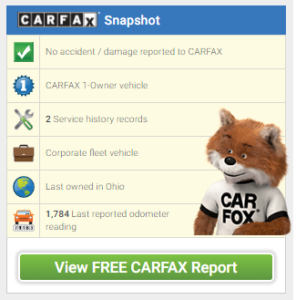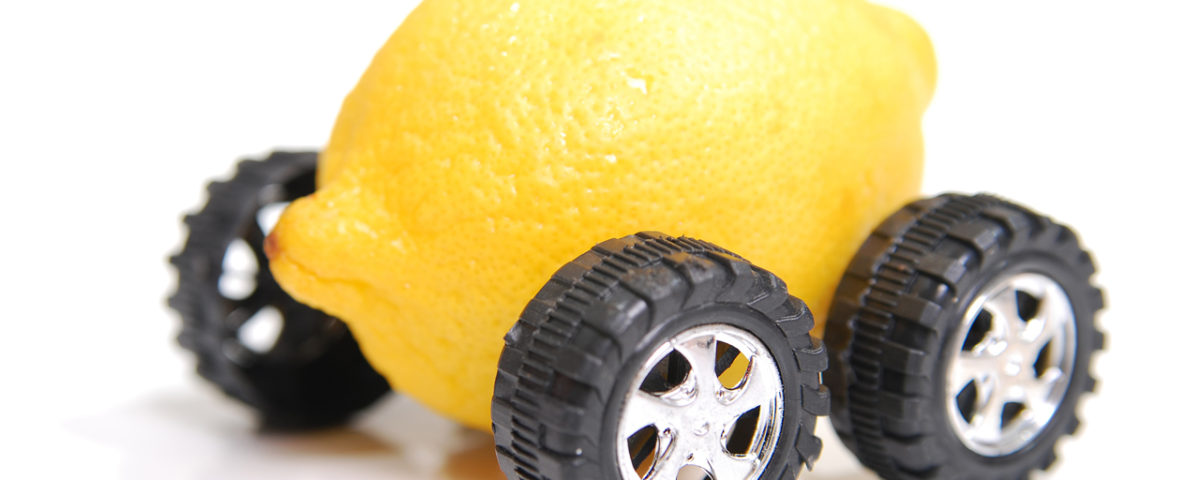Buying a used car has always been tough. In today’s market, it’s down right scary. Between the sluggish economy and the rising costs of new vehicles, people are hanging onto their cars an average of 10.2 years while skimping on the maintenance. As a result, used car inventories are tight, prices are high, and quality is down. And, while racing a “lemon” can be fun (for those of us who are crazy), getting stuck with one as your daily driver can be a nightmare. That’s why Maggie and I use ten quality criteria to evaluate pre-owned cars for our clients. Here are five key steps that YOU can follow to avoid buying a lemon.
1. Look for a car with a good reputation. The easiest way to avoid buying a lemon is to look for a car that wasn’t a piece of crap to start with! Research the quality and reliability history of different types of vehicles to identify which makes and models have a solid history of quality and reliability and which do not. (The PT Cruiser was a piece of junk new, so it will be an even bigger piece of junk used.) You will likely pay a slightly higher price for a good used car (like a Honda or Toyota), but you will save money on lower repair and maintenance costs in the long run.
2. Pick a reputable dealership. Some dealerships can be “lemons”, too. Many dealers care about their customers and about their own reputation, so they take the necessary steps to ensure the used cars they sell are of good quality. Unfortunately, some dealers are less… diligent, shall we say. When shopping for used cars for my clients, I know which dealers to work with and which ones to avoid like the plague. Don’t assume that a dealership is reputable just because it is a big franchise store associated with a manufacturer. It entirely depends on the philosophy of the owner and the managers. Also, don’t assume that a small, independent dealer is automatically a sheister. Some of the best dealers I work with are small, family-owned, hole-in-the-wall operations. Before visiting a dealership, research them with the Better Business Burearu, Yelp, Dealer Rater and other customer advocate websites. Ask the used car manager what criteria he/she uses to select used cars, and what he/she does to recondition those cars for resale. Finally, ask if the dealership is a “Carfax” dealer. If a dealership does not provide free Carfax reports for its vehicles, that’s a good sign that they may be hiding something.
 3. Get a Carfax report. I have said this a hundred times, and I will say it again… NEVER buy a used car without a Carfax report. While a Carfax report is not always 100% accurate, it is the best source of history information currently available for pre-owned vehicles. I look at 30 different pieces of data on a Carfax report when evaluating used cars for my clients. The report will tell you where the vehicle was previously titled (watch out for flood areas and northern states) and how it was registered (as a personal car, taxi, rental car or fleet vehicle, etc). It will also reveal whether the car’s title has been marked as salvaged or flood-damaged, if the vehicle was ever recalled, and even how often the vehicles has been serviced.
3. Get a Carfax report. I have said this a hundred times, and I will say it again… NEVER buy a used car without a Carfax report. While a Carfax report is not always 100% accurate, it is the best source of history information currently available for pre-owned vehicles. I look at 30 different pieces of data on a Carfax report when evaluating used cars for my clients. The report will tell you where the vehicle was previously titled (watch out for flood areas and northern states) and how it was registered (as a personal car, taxi, rental car or fleet vehicle, etc). It will also reveal whether the car’s title has been marked as salvaged or flood-damaged, if the vehicle was ever recalled, and even how often the vehicles has been serviced.
4. Ask to see the service records. Ask the seller or dealer to see the vehicle’s service records, if they have them. If the dealership took the used car in on trade from the previous owner, that previous owner may have given the dealership a copy of the records. (Ok, it’s rare, but it does happen.) If a car was serviced at a franchise dealership, those records may be on the Carfax report, or the franchise dealer can pull them up in the computer system. Look to see if the oil and other fluids were changed on schedule, and if major maintenance such as a timing-belt replacement was completed per the manufacturer’s recommended service schedule.
5. Get a pre-purchase inspection. The single most important thing you can do to avoid a lemon is to get a pre-purchase inspection by an independent, ASE Certified mechanic. Let me say it again – NEVER NEVER NEVER NEVER NEVER buy a used car without having it inspected first! Forking over $75-$100 for a thorough inspection by a qualified, experienced mechanic could save you THOUSANDS of dollars in the long run. A good mechanic can tell if the car has been wrecked, flooded, rebuilt, modified, raced or just flat-out neglected. Be sure to find a mechanic who is ASE Certified (preferably Master Certified) and who has a formal, documented pre-purchase inspection process.
Buying a used car in today’s market can be risky, and there are never any guarantees. Following these key steps will help you to minimize the risks and avoid getting stuck with a lemon. Or just contact The Car Chick a call to learn more about our hassle-free, lemon-free car buying process!

